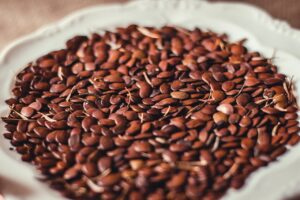The Benefits of Flaxseeds: Nature's Tiny Powerhouses
The Benefits of Flaxseeds: Nature’s Tiny Powerhouses.
Flaxseeds may be small, but their impact on health is enormous. As one of the oldest crops, flax has been cultivated since the beginning of civilization. These tiny seeds are packed with nutrients and offer numerous health benefits. In this post, we’ll delve into what flaxseeds are, how they work, and why they are so beneficial. Plus, we’ll share a delicious recipe to help you incorporate flaxseeds into your diet.
What Are Flaxseeds?
Flaxseeds, also known as linseeds, are the seeds of the flax plant (Linum usitatissimum). They are small, flat, and have a hard outer shell that is smooth and shiny. Flaxseeds come in two varieties: brown and golden, both equally nutritious.
How Do Flax Seeds Work?
Flaxseeds are a powerhouse of nutrients. Here’s how they work their magic:
Rich in Omega-3 Fatty Acids: Flaxseeds are one of the best plant-based sources of alpha-linolenic acid (ALA), a type of omega-3 fatty acid. Omega-3s are essential fats that have numerous health benefits, particularly for heart and brain health.
High in Fiber: Flaxseeds are loaded with dietary fiber, both soluble and insoluble. This fiber aids in digestive health, helps regulate blood sugar levels, and can assist in weight management by promoting a feeling of fullness.
Lignans: Flaxseeds contain lignans, which are plant compounds with antioxidant and estrogen properties. Lignans have been linked to a reduced risk of cancer and improved overall health.
Protein: Flaxseeds are a good source of plant-based protein, making them an excellent addition to vegetarian and vegan diets.

Why Do Flaxseeds Work?
Heart Health: The ALA in flaxseeds has been shown to reduce inflammation and protect against heart disease. Consuming flaxseeds can help lower blood pressure, reduce cholesterol levels, and improve overall heart health.
Digestive Health: The high fiber content in flaxseeds aids in maintaining a healthy digestive system. It promotes regular bowel movements and prevents constipation.
Cancer Prevention: Lignans in flaxseeds have antioxidant properties that may help reduce the risk of certain cancers, particularly breast cancer in women and prostate cancer in men.
Weight Management: The combination of protein, fiber, and healthy fats in flaxseeds helps control appetite and can contribute to weight loss and weight management.
Blood Sugar Control: Flaxseeds can help stabilize blood sugar levels, making them beneficial for individuals with diabetes or those at risk of developing diabetes.
Recipe: Flaxseed Pudding
Incorporating flaxseeds into your diet can be simple and delicious. Here’s a quick and easy recipe for a nutritious flaxseed pudding.
Ingredients:
- 1/4 cup ground flaxseeds
- 1 cup almond milk (or any milk of your choice)
- 1 tablespoon maple syrup or honey
- 1/2 teaspoon vanilla extract
- Fresh berries or sliced fruits for topping
- Nuts or seeds for extra crunch (optional)
Instructions:
Mix Ingredients: In a bowl, combine the ground flaxseeds, almond milk, maple syrup or honey, and vanilla extract. Stir well to combine.
Let It Thicken: Cover the bowl and refrigerate for at least 2 hours, or overnight. The flaxseeds will absorb the liquid and create a pudding-like consistency.
Serve: Once thickened, give the pudding a good stir. Serve topped with fresh berries, sliced fruits, and a sprinkle of nuts or seeds for added texture.
Enjoy: This pudding is not only delicious but also packed with nutrients, making it a perfect breakfast, snack, or dessert.
Flaxseeds are a versatile and highly nutritious addition to any diet. Their impressive nutrient profile supports heart health, digestion, cancer prevention, weight management, and blood sugar control. By incorporating flaxseeds into your daily routine, you can reap these powerful health benefits. Start with our flaxseed pudding recipe and enjoy the goodness of these tiny but mighty seeds.





